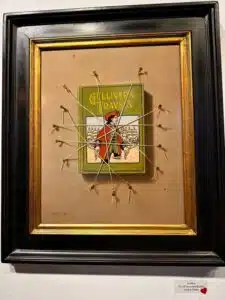Photo of my Mom, Gertrude M. Webb, in Iceland – circa 2004
Long before America Ferrara made her iconic 2023 Barbie speech about women’s inability to ever “get it right”, the 1991 book, “Be An Outrageous Older Woman”, by Ruth Harriet Jacobs, a gerontologist at the Wellesley College Center for Research on Women, published.
Jacobs’s book came to my attention through a friend, who told me that when she and her sisters were going through their mother’s effects after she had died, they found envelopes left for each of them. In each were two strategic pieces of wisdom, one from the book written by Ruth Jacobs, and the other, a more anonymous piece simply signed by “Charlyn.” When I asked her , she told me they were about relationships and boundary setting. She offered to send them to me, knowing they might find their way
into a blogpost. As you can tell, she was, of course, right about that.
When I read Jacobs’s “Word to the Wise on Mothers”, I thought of “the Barbie speech”, and how discouraging it was that so little had changed in the intervening 32 years. In her piece, Jacobs pairs inevitable contradictions, highlighting the impossible task of meeting societal and personal expectations: “If we are concerned, we are overprotective…. unconcerned, we are neglectful…. If we nurture generously, we are smothering…if we nurture less, we are withholding.”
- The burden of meeting impossible expectations, leads to inevitable disappointment.
Altering external pressures and attending to internal stresses is not for the faint of heart. But, if we make changes, we allow for the possibilities of great change and growth.
- Divorce and Family Restructuring create ruptures that are avenues for change.
Charlyn’s advice centered around taking control of the things we can take control of. She relayed her advice through an apocryphal story of being an exhausted, irritable, grumpy, bitter, and overwhelmed mother. Until….she changed.
She stopped trying to solve the problems her husband and adult children encountered. At first, they thought she must be ill. Then they proposed an intervention thinking her malaise was due to a medication addiction. But she gathered her family together and told them she’d realized that each person was responsible for their own life. Although she had spent her days trying to solve other people’s problems, she’d come to recognize that her anguish, anxiety, depression, insomnia, and stress didn’t solve anyone else’s problems and only aggravated her own.
She concluded that her new duty was to remain calm and let each person solve what corresponded to them. She told them she knew they had the necessary resources to solve their own problems. She would pray for them, love them, and encourage them to find their own happiness. She would give advice if asked, but she would no longer make decisions for them.
Everyone was speechless. But from that day on, the family began to function better because everyone knew exactly what they needed to do.
Many moms and wives see themselves as “fixers” of all things, wanting everyone to be happy, and never wanting their loved ones to struggle through difficult things. The irony is that the sooner we remove the responsibility from ourselves and deliver it where it belongs, the better off everyone is.
Charlyn concluded by saying:
“We are not here on earth to be everything to everyone. Stop putting that pressure on yourself.”
Now, on the cusp of a New Year, it seems fitting to ask ourselves:
- What responsibilities are serving us well, and what are not?
- What expectations are reasonable for us to accept and what are not?
- How can we better nurture others by attending to ourselves?
I will be asking myself these questions during 2025 and examining my answers. I invite you to join me on this journey, and would love to know your answers.




